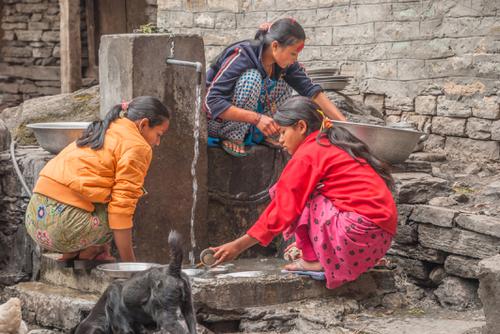当前位置:
X-MOL 学术
›
WIREs Water
›
论文详情
Our official English website, www.x-mol.net, welcomes your feedback! (Note: you will need to create a separate account there.)
Localizing resource insecurities: A biocultural perspective on water and wellbeing
WIREs Water ( IF 8.2 ) Pub Date : 2020-04-15 , DOI: 10.1002/wat2.1440 Alexandra A. Brewis 1 , Barbara Piperata 2 , Amanda L. Thompson 3 , Amber Wutich 1
WIREs Water ( IF 8.2 ) Pub Date : 2020-04-15 , DOI: 10.1002/wat2.1440 Alexandra A. Brewis 1 , Barbara Piperata 2 , Amanda L. Thompson 3 , Amber Wutich 1
Affiliation

|
A biocultural approach provides an emerging framework for clarifying the mechanisms that connect water security to human health and wellbeing. Five basic tenets of the biocultural approach are outlined: The focus on the local, the centrality of culture, the notion of embodied disadvantage, a concern with proximate mechanisms as a means to test theorized pathways, and recognition of intersecting and potentially amplified (syndemic) risks. From a review of both new and dispersed biocultural literature on household water, four key themes emerge: (a) individual vulnerabilities to the biological effects of water insecurity are shaped by cultural practices; (b) water insecurity is a powerful biocultural stressor on mental health; (c) water insecurity mediates between low power and worse health within communities, and through multiple mechanisms; (d) the household is a nexus for food–water interactions, each likely worsening each other and health through syndemic relationships. This sets an agenda for a biocultural approach to the household as a localizing nexus for manifesting the very human costs to mental and physical health of managing under conditions of extreme household resource insecurity.
中文翻译:

本地化资源不安全感:关于水和福祉的生物文化视角
生物文化方法为阐明将水安全与人类健康和福祉联系起来的机制提供了一个新兴的框架。概述了生物文化方法的五个基本原则:集中于本地,文化的中心性,隐性劣势的概念,对作为测试理论途径的手段的邻近机制的关注以及对相交和潜在放大(同病同声)的认识风险。通过对有关家庭用水的新的和分散的生物文化文献的回顾,出现了四个关键主题:(a)文化习俗塑造了个人对水不安全的生物影响的脆弱性;(b)水的不安全状况是心理健康的强大生物文化压力源;(c)水不安全状况通过多种机制在社区内的低功率与健康状况恶化之间进行调解;(d)家庭是食物与水相互作用的纽带,每一种都有可能通过同伴关系使彼此和健康恶化。这为家庭生物文化方法设定了议程,作为一种本地化联系,以显示在极端家庭资源不安全的条件下进行管理对精神和身体健康造成的巨大人力成本。
更新日期:2020-04-15
中文翻译:

本地化资源不安全感:关于水和福祉的生物文化视角
生物文化方法为阐明将水安全与人类健康和福祉联系起来的机制提供了一个新兴的框架。概述了生物文化方法的五个基本原则:集中于本地,文化的中心性,隐性劣势的概念,对作为测试理论途径的手段的邻近机制的关注以及对相交和潜在放大(同病同声)的认识风险。通过对有关家庭用水的新的和分散的生物文化文献的回顾,出现了四个关键主题:(a)文化习俗塑造了个人对水不安全的生物影响的脆弱性;(b)水的不安全状况是心理健康的强大生物文化压力源;(c)水不安全状况通过多种机制在社区内的低功率与健康状况恶化之间进行调解;(d)家庭是食物与水相互作用的纽带,每一种都有可能通过同伴关系使彼此和健康恶化。这为家庭生物文化方法设定了议程,作为一种本地化联系,以显示在极端家庭资源不安全的条件下进行管理对精神和身体健康造成的巨大人力成本。


























 京公网安备 11010802027423号
京公网安备 11010802027423号